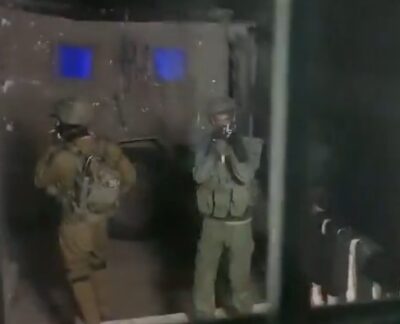Israeli soldiers have abducted at least 30 citizens from the West Bank over the past two days, including former prisoners, according to a report by the Palestinian Prisoners’ Society (PPS) and the Commission of Detainees and Ex-Detainees Affairs.
The report, released today, Sunday, stated that the abductions were concentrated in the Hebron Governorate and also occurred in the governorates of Hebron, Jenin, Bethlehem, Nablus, Qalqilia, and Ramallah. Among the abducted Palestinians are several former political prisoners, siblings, father and their sons.
It is worth mentioning that fourteen of the abducted Palestinians are from the Hebron governorate, in the southern part of the West Bank.
They have been identified as Ala’ Ayed Al-Froukh, Yazan Jamal Suleiman Al-Froukh, Riyad Sami Jaradat, Bassel and Abdul-Monem Jaradat, Nidal Ishaq Jaradat, his son Abdullah, Iyad Ishaq Hamed Jaradat, Ishaq Iyad Ishaq Jaradat, Ahmad Nasr Al-Froukh, Ali Yacoub Sawalha, Mazen Ballout, Abed Yousef Mer’ey and his brother Husam.
The statement added that the Israeli army continues to conduct extensive invasions and abuses, including assaults and threats against detainees and their families during the abduction campaigns. These actions are accompanied by field investigations and the destruction of citizens’ homes, cars, and other property.
It noted that the number of abductions since the start of the ongoing genocide and comprehensive aggression against the Palestinian people has reached more than 11,200 citizens from the West Bank, including the occupied capital, Jerusalem.
The army continues to implement systematic abduction campaigns as one of their most prominent fixed policies, which have escalated unprecedentedly since the start of the ongoing genocide, not only in terms of the number of detainees but also in the severity of the crimes committed.
In related news, the army tightened the military measures, Sunday, at the Awarta and Deir Sharaf roadblocks, west of Nablus in the occupied West Bank’s northern part.
The army increased the restrictions and military procedures at the roadblocks, leading to traffic jams stretching hundreds of meters.
Citizens suffer from the hardships caused by the checkpoints surrounding Nablus, which have hindered their movement and negatively impacted their daily lives.

